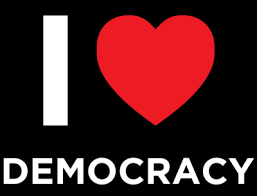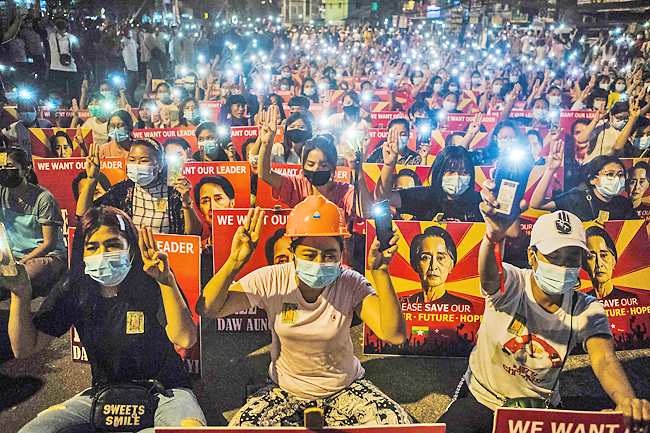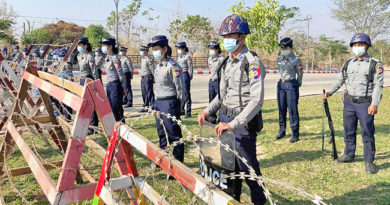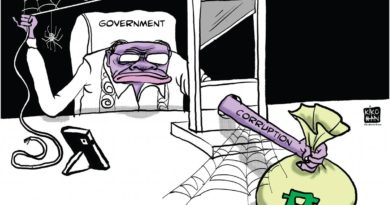DEMOCRACY-FREEDOM: SINGAPORE- Myanmar’s post-coup economy is in free fall
.
.

SINGAPORE (CNA) – A month before Myanmar’s November 2020 elections swept by the ruling National League for Democracy (NLD) party, the World Bank predicted that the Myanmar economy would recover strongly in 2021 and grow by 5.9 per cent.
Less than two months after the February 1 coup that annulled the election results, the World Bank projected that growth would plummet by 10 per cent in 2021, by far the worst in Southeast Asia.
With no end in sight for the violence, chaos and economic disaster caused by the military coup, the foreseeable future only promises further downward revisions, derailing Myanmar’s promising economic and political trajectory.
.
The junta, led by Commander-in-Chief Min Aung Hlaing and styled the State Administrative Council (SAC), sought to present a business-friendly image.
It appointed to key ministerial portfolios individuals well-known to the private sector and aid community, to signal policy continuity, and undertook to fast-track economic reforms.
This was an insinuation that Aung San Suu Kyi and her NLD government had not been competent enough to do so.
The private sector’s immediate response to the coup was muted, with only the American Chamber of Commerce in Myanmar (AMCHAM Myanmar) expressing its concerns for the rule of law. Fear added to the business sector’s initial silence. The junta quickly detained NLD leaders including Aung San Suu Kyi and President Win Myint, NLD government officials working on economic reforms, and economic advisors such as Australian academic
Sean Turnell.
Prominent Myanmar businesspersons deemed close to the NLD, including tycoons Zaw Zaw and Chit Khaing, were rounded up and interrogated. The arrest and detention of politicians, journalists, and members of civil society were reminiscent of the dark times under prior military juntas, and a harbinger of the SAC’s political – and economic – direction for Myanmar.
The formidable popular movement in opposition to the coup has given the lie to the junta’s ‘business-as-usual’ facade.
While maintaining its shtick about holding elections within a year, the SAC has deployed battle-hardened troops in major urban centers countrywide to quell protests, and repeatedly threatened civil servants, private sector executives, and employees to return to work.
The Civil Disobedience Movement (CDM) opposing the coup, through public and private sector strikes, has halted most economic activity in Myanmar.
The CDM continues even though the brutal crackdowns have considerably shrunk street protests. Banks have had to restrict their services and number of customers, as the junta forced them to reopen branches and prevent crowds.
The death of an employee of a Korean bank, shot by security forces while commuting from work, highlights the risks employees in essential sectors face, on top of Myanmar’s COVID-19 concerns. Businesses face other operational challenges due to the coup and coup protests. Many employees refuse to pay income tax as they consider the SAC illegitimate and not deserving of any tax revenue.
Some companies have changed these employees’ employment status to independent contractors to remove the onus of paying income tax – and the attendant responsibility and penalties – from the firms.
The business community soon became increasingly vocal as the deteriorating situation and international outcry added to pressure for companies to act.
Multiple companies and business chambers, including the Union of Myanmar Federation of Chambers of Commerce and Industry, rallied against the SAC’s attempt in mid-February to push through a draconian cybersecurity law.
.
The Myanmar Centre for Responsible Business facilitated the drafting of the February 19 statement expressing concern against the coup and its aftermath, signed since by dozens of foreign and local companies.
A month later, the Japan Chamber of Commerce and Industry in Myanmar issued its first statement calling for a return to “stability under democracy”. Several chambers issued a strong statement condemning the violence committed by security forces on Armed Forces Day (March 27) resulting in over 150 deaths.
With the West ramping up targeted sanctions, CDM strikes affecting business, and SAC troops shooting protestors, doing business in Myanmar has become a difficult and dangerous operational, compliance and reputational minefield.
The experience of Telenor and Total, two major foreign investors in the country, epitomise this lack of available “good” options.
Norway’s Telenor entered Myanmar under the Thein Sein government (2011 to 2016) which liberalised the telecommunications sector as part of its economic reforms.
Telenor now must comply with the junta’s orders to restrict data access, while having to pay its annual license fee. French energy firm Total has been present in Myanmar since the 1990s, facing significant criticisms then as the country was under military rule.
Under pressure to halt its payments to the Myanmar government following the coup, Total announced that it would not meet such demands as they could endanger its staff and electricity supply to Myanmar and Thailand. Total has committed to pay amounts similar to what it gives to the junta to human rights organisations.
Can foreign corporations like Total and Telenor survive in Myanmar given the deteriorating local situation and global economic restrictions? Decisions will vary depending on economic sector, country of origin, shareholder structure and corporate governance.
However, the longer it takes to find an offramp solution to the current political crisis, the more the crisis’ ultimate losers, the Myanmar people, will bear as the economic gains of the past decade vanish.











